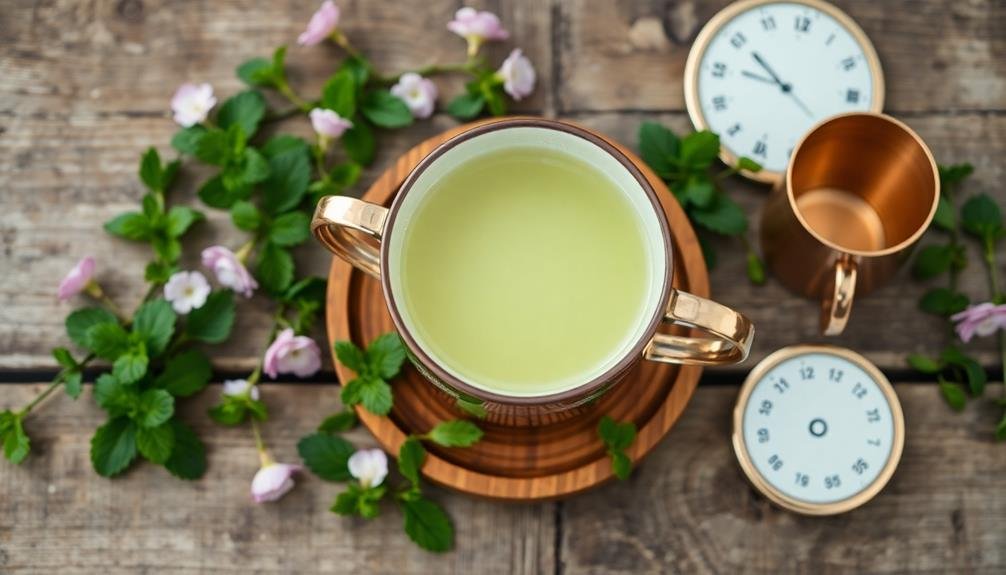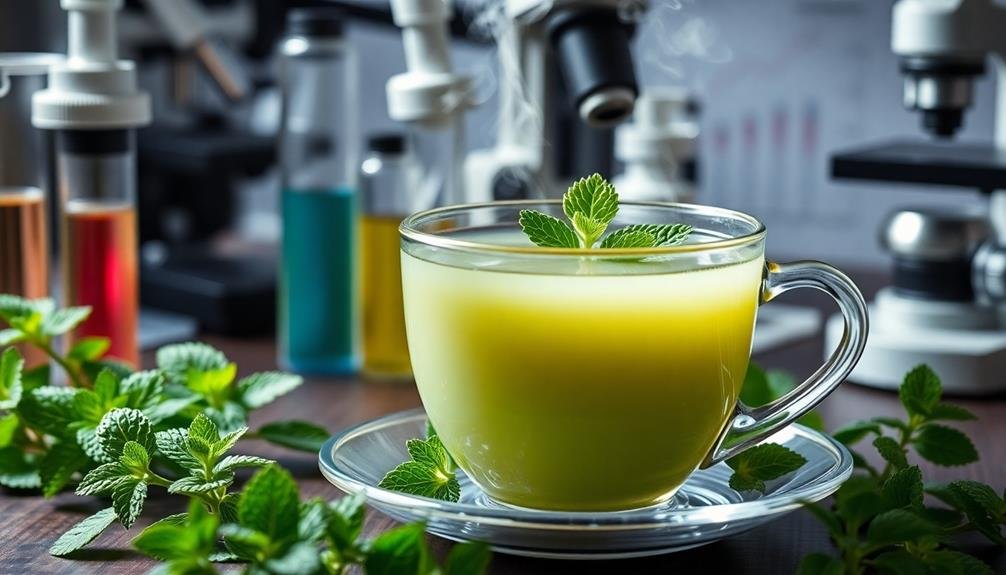Spearmint tea offers natural support for hormone health, particularly for those with imbalances or conditions like PCOS. It's caffeine-free and rich in compounds like rosmarinic acid and flavonoids. Regular consumption can help regulate androgen levels, potentially reducing symptoms like acne, hirsutism, and irregular periods. You'll typically brew it by steeping leaves for 5-7 minutes, enjoying 1-2 cups daily for best effects. While generally safe, it's wise to consult a healthcare provider before use, especially if pregnant or breastfeeding. Combining spearmint with other herbs may enhance its hormone-balancing benefits. Discover how this simple beverage could transform your hormonal wellness journey.
Understanding Spearmint Tea

Spearmint tea, derived from the Mentha spicata plant, is a rejuvenating herbal infusion with a long history of medicinal use. This invigorating beverage boasts a crisp, minty flavor and a subtle sweetness that sets it apart from other mint varieties.
You'll find that spearmint tea is caffeine-free, making it an excellent choice for those looking to reduce their caffeine intake or enjoy a soothing drink before bedtime.
The leaves of the spearmint plant contain various beneficial compounds, including rosmarinic acid, flavonoids, and menthol. These components contribute to the tea's potential health benefits, particularly its effects on hormone balance.
When you brew spearmint tea, you're extracting these valuable nutrients into your cup.
To prepare spearmint tea, you can use fresh leaves from your garden or dried leaves available in tea bags or loose-leaf form. Steep the leaves in hot water for about 5-7 minutes to release their full flavor and beneficial properties.
You can enjoy spearmint tea hot or cold, and it's often consumed without any additives to fully appreciate its natural taste and benefits.
Hormonal Imbalance Symptoms
Recognizing the signs of hormonal imbalance is vital for your overall health.
You might experience physical symptoms like unexplained weight gain, acne, or irregular periods.
Emotionally, you could notice mood swings, anxiety, or changes in your libido, all of which can indicate underlying hormonal issues.
Common Signs and Indicators
Understanding the signs of hormonal imbalance is essential for identifying potential issues early on. You might notice irregular menstrual cycles, with periods becoming heavier, lighter, or more sporadic. Unexplained weight gain or difficulty losing weight, especially around your midsection, can also indicate hormonal problems.
Mood swings, irritability, and depression are common emotional symptoms, while physical signs include fatigue, insomnia, and changes in appetite. You may experience skin issues like acne or excessive dryness, as well as hair loss or unwanted hair growth.
Decreased libido and vaginal dryness in women, or erectile dysfunction in men, can signal hormonal imbalances. Hot flashes, night sweats, and breast tenderness are often associated with menopause but can occur at other times due to hormonal fluctuations.
Digestive problems, such as bloating or constipation, may arise from hormonal changes affecting your gut. Headaches, muscle weakness, and joint pain can also be linked to hormonal issues.
If you're experiencing unexplained changes in body temperature, increased thirst, or frequent urination, these could be signs of thyroid or adrenal gland imbalances.
Physical and Emotional Symptoms
Hormonal imbalances can manifest through a wide range of physical and emotional symptoms. You might experience unexplained weight gain or loss, despite maintaining your usual diet and exercise routine. Fatigue can set in, leaving you feeling drained and unmotivated, even after a full night's sleep. Skin issues, like acne or excessive dryness, may suddenly appear or worsen.
Emotionally, hormonal imbalances can take a toll on your mental well-being. You may find yourself struggling with mood swings, irritability, or even bouts of depression. Anxiety levels might increase, making it difficult to cope with everyday stressors. Some people also report a decrease in libido or changes in sexual function.
Other common physical symptoms include:
- Irregular menstrual cycles or heavy periods
- Hair thinning or excessive hair growth in unwanted areas
- Muscle weakness or joint pain
It's important to note that these symptoms can vary greatly from person to person and may overlap with other health conditions. If you're experiencing a combination of these symptoms, it's advisable to consult with a healthcare professional for proper diagnosis and treatment.
Spearmint's Active Compounds

Spearmint leaves regularly boast a rich array of beneficial compounds. These active ingredients work synergistically to support hormone health and alleviate various symptoms. The primary compounds you'll find in spearmint include rosmarinic acid, limonene, and carvone.
Rosmarinic acid is a potent antioxidant that helps reduce inflammation and oxidative stress in your body. It's known to have anti-androgenic properties, which can help balance hormone levels, particularly in women with polycystic ovary syndrome (PCOS).
Limonene, a terpene found in many citrus fruits, contributes to spearmint's invigorating aroma and offers potential anti-inflammatory and stress-reducing effects.
Carvone, the compound responsible for spearmint's distinct flavor, has been shown to have antispasmodic properties. This can help alleviate menstrual cramps and digestive discomfort often associated with hormonal imbalances.
Additionally, spearmint contains flavonoids like luteolin and apigenin, which may help regulate estrogen levels and support overall hormonal balance.
Regulating Androgen Levels
For years, researchers have been exploring spearmint's potential to regulate androgen levels, particularly in women with hormonal imbalances. Androgens, like testosterone, play a vital role in your body's functions, but excess levels can lead to unwanted symptoms. Spearmint tea may help by naturally lowering androgen production.
Studies have shown that drinking spearmint tea twice daily can greatly reduce free testosterone levels in women with polycystic ovary syndrome (PCOS). This reduction can alleviate symptoms such as:
- Excessive facial and body hair growth
- Acne and oily skin
- Irregular menstrual cycles
The active compounds in spearmint, including rosmarinic acid and flavonoids, are believed to inhibit the enzyme 5-alpha reductase. This enzyme converts testosterone into the more potent dihydrotestosterone (DHT). By blocking this conversion, spearmint may help maintain a healthier hormone balance.
While more research is needed, incorporating spearmint tea into your daily routine could be a simple and natural way to support hormone health.
It's essential to recognize that spearmint tea shouldn't replace prescribed medications, and you should always consult your healthcare provider before making significant changes to your diet or supplement regimen.
Menstrual Cycle Support

Many women experience discomfort and irregularities during their menstrual cycle, but spearmint tea may offer some relief. This aromatic brew contains compounds that can help balance hormones and alleviate common menstrual symptoms.
Spearmint tea's anti-androgenic properties can reduce excess testosterone levels, which often contribute to menstrual irregularities. By promoting hormone balance, you may experience more regular cycles and less severe PMS symptoms. The tea's anti-inflammatory effects can also help ease cramps and bloating.
Here's how spearmint tea can support your menstrual cycle:
| Benefit | Effect |
|---|---|
| Hormone Balance | Regulates estrogen and testosterone levels |
| Cramp Relief | Reduces uterine contractions and pain |
| Mood Stabilization | Alleviates mood swings and irritability |
| Bloating Reduction | Decreases water retention and discomfort |
To maximize these benefits, try drinking 2-3 cups of spearmint tea daily, especially in the week leading up to your period. You can also combine it with other hormone-balancing herbs like chamomile or red raspberry leaf for enhanced effects. Remember, while spearmint tea can be helpful, it's not a substitute for medical treatment if you're experiencing severe menstrual issues.
Acne and Hirsutism Relief
Beyond its menstrual benefits, spearmint tea offers relief for those struggling with acne and hirsutism. These conditions often stem from hormonal imbalances, particularly excess androgens like testosterone. Spearmint tea's anti-androgenic properties can help combat these issues naturally.
When you drink spearmint tea regularly, you may experience:
- Clearer skin with fewer acne breakouts
- Reduced facial and body hair growth
- A smoother, more even complexion
Research suggests that spearmint tea can considerably lower free testosterone levels in women with hirsutism. This reduction in androgens can lead to less severe symptoms over time.
For acne sufferers, the tea's anti-inflammatory and antioxidant properties may help calm irritated skin and reduce redness.
To reap these benefits, try drinking 2-3 cups of spearmint tea daily. You'll likely need to maintain this routine for several weeks or months before noticing considerable improvements.
PCOS Management

Spearmint tea's potential extends to managing Polycystic Ovary Syndrome (PCOS), a common hormonal disorder affecting women of reproductive age. Its anti-androgenic properties make it a promising natural remedy for PCOS symptoms. By reducing testosterone levels, spearmint tea may help regulate menstrual cycles and improve fertility.
Regular consumption of spearmint tea can contribute to better hormone balance, potentially alleviating some of the challenging symptoms associated with PCOS. Here's how spearmint tea may benefit PCOS management:
| Benefit | Explanation |
|---|---|
| Hormone Regulation | Reduces androgen levels |
| Menstrual Cycle | May help normalize irregular periods |
| Fertility | Can improve ovulation rates |
| Insulin Sensitivity | May enhance insulin response |
While spearmint tea shouldn't replace prescribed treatments, it can be a valuable addition to your PCOS management plan. Aim for 2-3 cups daily to experience potential benefits. Remember, consistency is key when using natural remedies. Always consult your healthcare provider before making significant changes to your PCOS management routine, especially if you're taking medications or have other health conditions.
Fertility and Reproductive Health
Building on spearmint tea's potential for PCOS management, it's important to explore its broader impact on fertility and reproductive health. Spearmint tea's anti-androgenic properties may benefit both men and women struggling with fertility issues.
For women, reduced androgen levels can help regulate menstrual cycles and improve ovulation, potentially increasing the chances of conception. In men, while some testosterone is essential for fertility, excessive levels can negatively impact sperm production and quality.
Regular consumption of spearmint tea might help:
- Balance hormone levels, creating an ideal environment for conception
- Reduce stress and anxiety, which can interfere with reproductive processes
- Improve overall reproductive organ health through its antioxidant properties
It's important to note that while spearmint tea shows promise, it shouldn't replace medical advice or treatment for fertility issues.
If you're trying to conceive, consider incorporating spearmint tea into your daily routine as a complementary approach. However, consult with your healthcare provider before making significant changes to your diet or lifestyle, especially if you're undergoing fertility treatments or have underlying health conditions.
Brewing Spearmint Tea

To brew the perfect cup of spearmint tea for hormone health, you'll want to start with high-quality, fresh spearmint leaves.
Proper steeping techniques are essential; steep your leaves in hot water for 5-7 minutes to extract the most beneficial compounds.
If you prefer a revitalizing alternative, you can also try cold brewing your spearmint tea overnight in the refrigerator.
Choosing Quality Spearmint Leaves
When it comes to brewing a delicious and potent cup of spearmint tea, selecting high-quality leaves is crucial. You'll want to look for fresh, vibrant leaves that are free from discoloration or signs of decay. Opt for organic spearmint whenever possible to avoid pesticides and other harmful chemicals that could interfere with the tea's hormone-balancing properties.
If you're purchasing dried spearmint leaves, verify they're still aromatic and haven't lost their distinctive minty scent. The leaves should be a rich green color, not brown or yellowed.
When shopping for spearmint, consider these quality indicators:
- Bright, uniform green color
- Strong, invigorating aroma
- Crisp, intact leaves without crumbling
You can find high-quality spearmint leaves at health food stores, specialty tea shops, or reputable online retailers. If you have a green thumb, growing your own spearmint plants is an excellent way to verify a fresh supply.
Spearmint is relatively easy to cultivate and can thrive in various climates. By choosing the best quality leaves, you'll maximize the potential health benefits and enjoy a more flavorful, satisfying cup of spearmint tea.
Proper Steeping Techniques
Now that you've selected your high-quality spearmint leaves, it's time to brew the perfect cup of tea. To maximize the health benefits and flavor, follow these steeping techniques:
Start by boiling fresh, filtered water. Once it reaches a rolling boil, remove it from heat and let it cool for about 30 seconds. The ideal temperature for steeping spearmint tea is around 190-200°F (88-93°C).
Place 1-2 teaspoons of dried spearmint leaves or 3-4 fresh leaves into a tea infuser or directly into your cup. Pour the hot water over the leaves and cover the cup to retain the aromatic oils.
Steep the tea for 5-7 minutes, depending on your desired strength. Avoid steeping for longer than 10 minutes, as this can result in a bitter taste. If you're using fresh leaves, you may need to steep for an extra minute or two.
After steeping, remove the leaves or infuser and enjoy your tea. For a sweeter taste, add a small amount of honey or stevia. You can also chill the tea and serve it over ice for a revitalizing summer beverage.
Hot vs. Cold Brewing
While hot brewing is the traditional method for preparing spearmint tea, cold brewing offers a unique alternative with its own set of benefits.
Hot brewing involves steeping spearmint leaves in boiling water for 5-10 minutes, resulting in a bold, aromatic cup of tea. This method quickly extracts the essential oils and compounds from the leaves, creating a robust flavor profile.
Cold brewing, on the other hand, requires a longer steeping time but produces a smoother, less bitter tea. To cold brew, simply combine spearmint leaves with room temperature water and refrigerate for 8-12 hours. This gentle extraction process preserves more of the tea's delicate flavors and potentially retains more of its beneficial compounds.
When deciding between hot and cold brewing, consider:
- Your time constraints
- Desired flavor intensity
- Intended use (e.g., hot tea for relaxation, cold tea for refreshment)
Both methods can effectively harness spearmint's hormone-balancing properties.
Hot brewing may be preferable for immediate consumption and warming effects, while cold brewing is ideal for making larger batches to enjoy throughout the day.
Experiment with both techniques to find your preferred method for incorporating spearmint tea into your hormone health routine.
Recommended Dosage and Timing
Generally, health experts recommend drinking 1-2 cups of spearmint tea daily for ideal hormone-balancing effects. The timing of consumption can be essential for maximizing benefits. Many find it most effective to drink a cup in the morning and another in the evening, allowing the body to absorb the tea's active compounds throughout the day.
When brewing spearmint tea, steep for 5-10 minutes to extract optimal amounts of beneficial compounds. If you're using it specifically for hormone balance, consistency is key. Aim to incorporate it into your daily routine for at least a month before evaluating its effects.
Here's a quick guide to help you enhance your spearmint tea consumption:
| Time of Day | Dosage | Benefits | Notes |
|---|---|---|---|
| Morning | 1 cup | Kickstart metabolism | Drink before breakfast |
| Afternoon | 1 cup | Reduce stress | Ideal for mid-day break |
| Evening | 1 cup | Promote relaxation | Drink 1-2 hours before bed |
| Before Exercise | 1 cup | Boost energy | Drink 30 minutes prior |
Potential Side Effects

Spearmint tea is typically well-tolerated, but some individuals may experience side effects. While rare, these effects can include mild digestive discomfort, such as nausea or stomach upset. If you're sensitive to mint or have a history of gastroesophageal reflux disease (GERD), you might be more prone to these issues.
For some people, spearmint tea can cause:
- Heartburn or acid reflux, especially when consumed in large quantities
- Allergic reactions, including skin rashes or breathing difficulties
- Headaches or dizziness, particularly in those sensitive to menthol
If you're pregnant or breastfeeding, consult your healthcare provider before incorporating spearmint tea into your routine. While it's generally considered safe, there's limited research on its effects during pregnancy and lactation.
It's also worth noting that spearmint tea may interact with certain medications, particularly those affecting hormone levels. If you're taking any prescription drugs, especially for hormonal conditions, talk to your doctor before consuming spearmint tea regularly.
They can advise you on potential interactions and help you determine if it's safe for your specific situation.
Combining With Other Herbs
Enhancing the benefits of spearmint tea can be achieved by combining it with other herbs. You'll find that certain herb combinations can amplify spearmint's hormone-balancing effects or address related health concerns.
Consider blending spearmint with green tea for an antioxidant boost and potential metabolism support. Chamomile can complement spearmint's calming properties, making it an excellent choice for stress reduction and better sleep.
If you're looking to target menstrual discomfort, try adding raspberry leaf or cramp bark to your spearmint brew.
For those focusing on hormonal acne, combining spearmint with burdock root or dandelion root may enhance detoxification processes. If you're aiming to support thyroid function, blending spearmint with ashwagandha or holy basil could prove advantageous.
Remember that while herb combinations can be powerful, they may also interact with medications or have unexpected effects.
It's essential to consult with a healthcare professional before incorporating new herbal blends into your routine, especially if you have existing health conditions or are pregnant. Start with small amounts and monitor your body's response to guarantee you're reaping the benefits without unwanted side effects.
Scientific Studies and Research

Backed by a growing body of research, spearmint tea's effects on hormone health have gained scientific attention. Studies have shown that spearmint can greatly reduce testosterone levels in women with hirsutism, a condition characterized by excessive hair growth.
In a 2007 study published in Phytotherapy Research, women who drank spearmint tea twice daily for five days experienced a reduction in free testosterone levels.
Another study in the Journal of Endocrinology and Metabolism found that spearmint tea consumption led to:
- Decreased free and total testosterone levels
- Increased luteinizing hormone and follicle-stimulating hormone
- Improved overall hirsutism scores
Research has also explored spearmint's potential in managing polycystic ovary syndrome (PCOS). A 2010 study in Phytotherapy Research showed that women with PCOS who drank spearmint tea for 30 days had lower testosterone levels and improved self-reported hirsutism scores.
While these findings are promising, it's essential to recognize that more extensive research is needed to fully understand spearmint's long-term effects on hormone health.
As with any natural remedy, it's vital to consult your healthcare provider before incorporating spearmint tea into your hormone management routine.
Frequently Asked Questions
Can Spearmint Tea Interact With Birth Control Pills or Hormone Replacement Therapy?
You should consult your doctor before using spearmint tea with birth control pills or hormone replacement therapy. It's possible that spearmint could interact with these medications, potentially affecting their effectiveness or causing unwanted side effects.
Is Spearmint Tea Safe to Consume During Pregnancy or While Breastfeeding?
While you're pregnant or breastfeeding, it's best to consult your healthcare provider before drinking spearmint tea. There's limited research on its safety during these periods, so it's wise to err on the side of caution.
How Long Does It Take to See Results From Drinking Spearmint Tea?
You'll typically notice results from drinking spearmint tea within 1-3 months of consistent use. However, everyone's body responds differently. It's best to consume it daily and be patient as you monitor your progress over time.
Can Men Benefit From Drinking Spearmint Tea for Hormonal Balance?
Yes, you can benefit from spearmint tea for hormonal balance. It may help reduce excess testosterone levels, which could improve acne and hirsutism. However, you'll need to drink it consistently for several weeks to see potential effects.
Are There Any Alternatives to Spearmint Tea for Hormone Regulation?
You've got options for hormone regulation beyond spearmint tea. Try green tea, dandelion root, or chamomile. Adaptogenic herbs like ashwagandha and rhodiola can help too. Don't forget lifestyle changes: exercise, stress management, and a balanced diet.
In Summary
You've now learned about spearmint tea's potential to support hormone health naturally. While it shows promise in regulating androgens and easing menstrual symptoms, remember that more research is needed. If you're considering using spearmint tea for hormonal issues, start with the recommended dosage and consult your healthcare provider. Be aware of possible side effects and interactions with other herbs. Ultimately, spearmint tea can be a gentle, natural addition to your hormone-balancing routine.





Leave a Reply